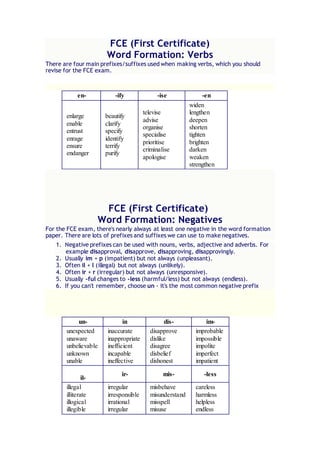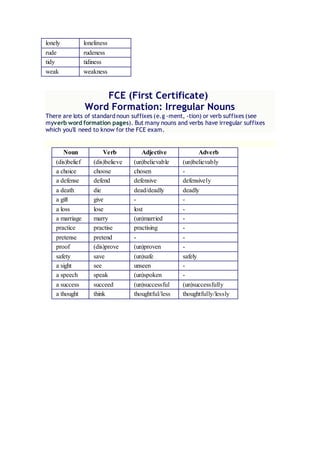Word formation FCE
- 1. FCE (First Certificate) Word Formation: Verbs There are four main prefixes/suffixes used when making verbs, which you should revise for the FCE exam. en- -ify -ise -en enlarge enable entrust enrage ensure endanger beautify clarify specify identify terrify purify televise advise organise specialise prioritise criminalise apologise widen lengthen deepen shorten tighten brighten darken weaken strengthen FCE (First Certificate) Word Formation: Negatives For the FCE exam, there's nearly always at least one negative in the word formation paper. There are lots of prefixes and suffixes we can use to make negatives. 1. Negative prefixes can be used with nouns, verbs, adjective and adverbs. For example disapproval, disapprove, disapproving, disapprovingly. 2. Usually im + p (impatient) but not always (unpleasant). 3. Often il + l (illegal) but not always (unlikely). 4. Often ir + r (irregular) but not always (unresponsive). 5. Usually -ful changes to -less (harmful/less) but not always (endless). 6. If you can't remember, choose un - it's the most common negative prefix un- in dis- im- unexpected unaware unbelievable unknown unable inaccurate inappropriate inefficient incapable ineffective disapprove dislike disagree disbelief dishonest improbable impossible impolite imperfect impatient il- ir- mis- -less illegal illiterate illogical illegible irregular irresponsible irrational irregular misbehave misunderstand misspell misuse careless harmless helpless endless
- 2. FCE (First Certificate) Word Formation: Nouns with -ion One of the most common ways to change a verb to a noun is with -ion (e.g. act to action) and -ation (e.g. observe to observation). Sometimes we also change the verb stem as well when we make the noun like this (e.g. explain to explanation). The table below shows common nouns in which the spelling of the stem also changes. Noun Verb Adjective application apply applicable permission permit permissable solution solve unsolved description describe descriptive intention intend unintended competition compete competitive decision decide decisive explanation explain unexplained production produce productive repetition repeat repetitive consumption comsume consumable qualification qualify qualified FCE (First Certificate) Word Formation: Nouns with -ence and -ance Two common noun endings are -ance and -ence. Usually, their adjectives are made with -ant and -ent. Here are some common examples which might help you in the FCE exam. Noun (-ence) Adjective Verb evidence evident - existence existing to exist (in)dependence (in)dependent to depend difference different to differ intelligence intelligent - (dis)obedience (dis)obedient to (dis)obey excellence excellent to excel silence silent to silence violence violent to violate innocence innocent - occurrence - to occur
- 3. (im)patience (im)patient - Noun (-ance) Adjective Verb attendance attendant (person) - to attend assistance assistant (person) - to assist (dis)appearance apparent to (dis)appear distance distant - (un)importance (un)important - acceptance accepting accept reassurance reassured to reassure (ir)relevance (ir)relevant - (in)significance (in)significant to signify FCE (First Certificate) Word Formation Verb + ment / adjective + ness Many verbs can form nouns with the suffix -ment. And many adjectives can form their nouns with the suffix -ness. Verb Noun achieve achievement amuse amusement argue argument develop development encourage encouragement excite excitement improve improvement involve involvement judge judgement measure measurement Adjective Noun aware awareness dark darkness forgetful forgetfulness happy happiness homeless homelessness lazy laziness
- 4. lonely loneliness rude rudeness tidy tidiness weak weakness FCE (First Certificate) Word Formation: Irregular Nouns There are lots of standard noun suffixes (e.g -ment, -tion) or verb suffixes (see myverb word formation pages). But many nouns and verbs have irregular suffixes which you'll need to know for the FCE exam. Noun Verb Adjective Adverb (dis)belief (dis)believe (un)believable (un)believably a choice choose chosen - a defense defend defensive defensively a death die dead/deadly deadly a gift give - - a loss lose lost - a marriage marry (un)married - practice practise practising - pretense pretend - - proof (dis)prove (un)proven - safety save (un)safe safely a sight see unseen - a speech speak (un)spoken - a success succeed (un)successful (un)successfully a thought think thoughtful/less thoughtfully/lessly
- 5. FCE (First Certificate) Word Formation: height, width ... The word formation part of the FCE use of English exam often tests adjectives such as 'short', 'wide', 'dark' and their nouns and verbs. Here is a list of some of the more common adjectives and their forms. . Adjective Noun Verb deep depth deepen high height heighten - weight weigh wide width widen long length lengthen short shortage (= not enough) shortness (= not tall) shorten large enlargement enlarge low - lower tight tightness tighten loose looseness loosen strong strength strengthen weak weakness weaken dark darkness dark darken bright brightness brighten




